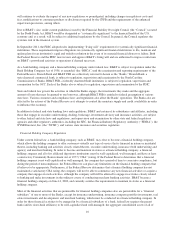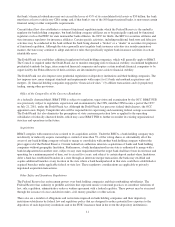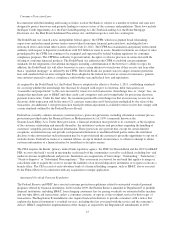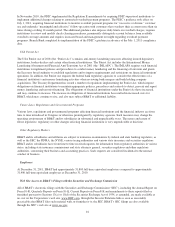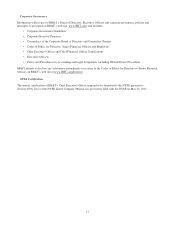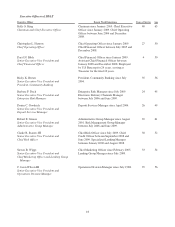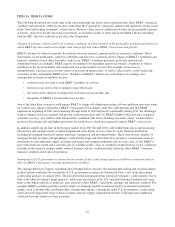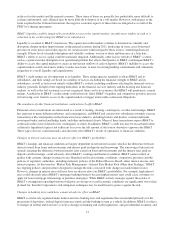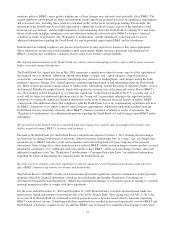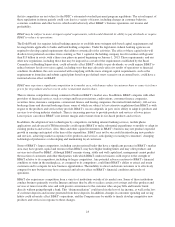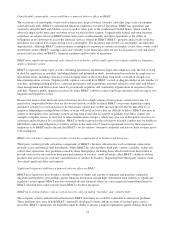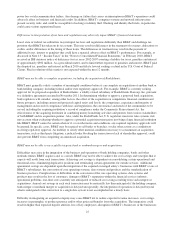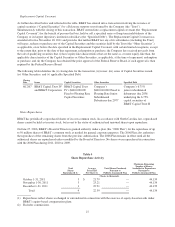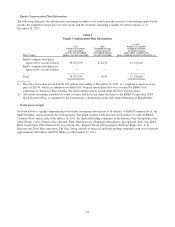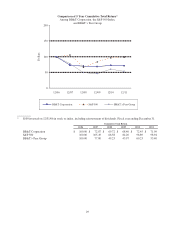BB&T 2011 Annual Report Download - page 20
Download and view the complete annual report
Please find page 20 of the 2011 BB&T annual report below. You can navigate through the pages in the report by either clicking on the pages listed below, or by using the keyword search tool below to find specific information within the annual report.Weakness in the markets for residential or commercial real estate, including the secondary residential mortgage loan
markets, could reduce BB&T’s net income and profitability.
Since 2007, softening residential housing markets, increasing delinquency and default rates, and increasingly volatile and
constrained secondary credit markets have been negatively impacting the mortgage industry. BB&T’s financial results
have been adversely affected by changes in real estate values, primarily in Georgia, Florida and metro Washington, D.C.,
with some deterioration in the coastal areas of the Carolinas. Decreases in real estate values have adversely affected the
value of property used as collateral for loans and investments in BB&T’s portfolio. For example, the poor economic
conditions experienced in 2007 through 2010, coupled with slow economic growth and ongoing concerns regarding
economic recovery, have resulted in decreased demand for real estate loans, and BB&T’s net income and profits have
suffered as a result.
The declines in home prices in many markets across the U.S., including a number of markets in BB&T’s banking footprint
(primarily in Georgia, Florida, and metro Washington, D.C., with some deterioration in the coastal areas of the Carolinas),
along with the reduced availability of mortgage credit, also has resulted in increases in delinquencies and losses in
BB&T’s portfolio of loans related to residential real estate, including its acquisition, development and construction loan
portfolio. Further declines in home prices within BB&T’s banking footprint (including markets that to date have not
experienced significant declines) coupled with the continued impact of the economic recession and high unemployment
levels could drive losses beyond the levels provided for in BB&T’s allowance for loan losses. In that event, BB&T’s
future earnings would be adversely affected.
Significant ongoing disruption in the secondary market for residential mortgage loans has limited the market for and
liquidity of most mortgage loans other than conforming Fannie Mae, Freddie Mac and Ginnie Mae loans. The effects of
ongoing mortgage market challenges, combined with the ongoing correction in residential real estate market prices and
reduced levels of home sales has resulted in price reductions in single family home values, adversely affecting the value
of collateral securing mortgage loans held and mortgage loan originations. Continued declines in real estate values and
home sales volumes within BB&T’s banking footprint, and financial stress on borrowers as a result of job losses, or other
factors, could have further adverse effects on borrowers that result in higher delinquencies and greater charge-offs in
future periods, which would adversely affect BB&T’s financial condition and results of operations.
The Colonial loan portfolios are largely covered by shared-loss agreements, however, BB&T is not immune from losses or
risks relative to these portfolios.
On August 14, 2009, Branch Bank entered into an agreement with the Federal Deposit Insurance Corporation (“FDIC”) to
acquire certain assets and assume substantially all of the deposits and certain liabilities of Colonial Bank, an Alabama
state-chartered bank headquartered in Montgomery, Alabama (“Colonial”). As a result, Branch Bank acquired a
significant portfolio of loans from Colonial. Although Branch Bank marked down the acquired loan portfolio to estimated
fair value, the acquired loans could suffer further deterioration in value resulting in additional charge-offs to this loan
portfolio. Fluctuations in national, regional and local economic conditions, including those related to local residential real
estate, commercial real estate and construction markets may increase the level of charge-offs on the loan portfolio that
was acquired in the acquisition of Colonial and correspondingly reduce BB&T’s net income. These fluctuations are not
predictable, cannot be controlled and may have a material adverse impact on BB&T’s operations and financial condition
even if other favorable events occur. Although Branch Bank entered into loss sharing agreements with the FDIC, which
provide that a significant portion of losses related to specified loan portfolios that were acquired in connection with the
acquisition of Colonial will be borne by the FDIC, Branch Bank is not protected from all losses resulting from charge-offs
with respect to those specified loan portfolios. Additionally, the loss sharing agreements have limited terms; therefore, any
charge-off of related losses that Branch Bank experiences after the term of the loss sharing agreements will not be
reimbursed by the FDIC and will negatively impact BB&T’s net income.
The Colonial acquisition has increased Branch Bank’s commercial real estate and construction loan portfolio, which
have a greater credit risk than residential mortgage loans.
With the acquisition of the Colonial loan portfolio, the commercial real estate loan and construction loan portfolios have
become a larger portion of Branch Bank’s total loan portfolio than it was prior to the Colonial acquisition. This type of
lending is generally considered to have more complex credit risks than traditional single-family residential lending,
because the principal repayment may be dependent on the successful operation of the related real estate or construction
project. Consequently, commercial real estate and construction loans are more sensitive to the current adverse conditions
20


